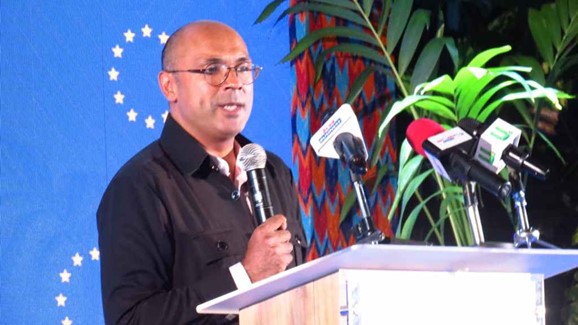The European Union (EU) Ambassador to Ghana, Irchad Razaaly, reiterated that the future of the EU’s relationship with Ghana lies in nurturing young talent and providing the necessary tools and opportunities to aid in national development.
This, he said, would be achieved through its flagship initiative, the Erasmus+ Programme, which is a central pillar of its education support in offering Ghanaian youths a unique opportunity to gain top-level academic experience.
He emphasised that individual member-states also have measures in place to deepen scholarship support for the youth.
Speaking at the Study in Europe Networking Event in Accra, he mentioned that beyond schooling, the Erasmus Mundo Plus programme allowed for cultural exchange between Europe and students from around the world.
“Last year, on this same occasion, we launched the EU-Ghana Pact for Skills Programme, one of our largest programmes on education and job creation. The collaboration is pivotal in transforming Ghana’s educational landscape and empowering Ghanaian youths through enhanced educational mobility,” he said.
Each year, approximately 1000 students fly over to the best universities in Europe with the help of scholarships offered by the EU and its member-states. In addition, European universities provide many scholarships through bilateral agreements with Ghanaian universities.
“l invite all of you to visit the various information desks to learn more about the successful partnerships between Europe and Ghana in tertiary education,” he added.
Themed ‘Empowering the Ghanaian Youth’, the event brought various stakeholders together to share information on various initiatives available for youth empowerment and avenues to study abroad.
The event is a partnership between the EU and Ghana to invest in the future of Ghanaian youths. There was a scholarship fair hosted by the EU to showcase a variety of exciting scholarship programmes offered by European universities.
Deputy Director-General, Ghana Tertiary Education Commission (GTEC), Prof. Yayra Dzakadzie, highlighted that the EU’s decision to invest in Ghana’s tertiary education through the “EU-Ghana Pact for Skills” Programme was a testament to their unwavering commitment to promoting sustainable employability and enhancing the skills of our students.
He said the initiative aligned perfectly with Ghana’s shared vision of equipping young talents with the necessary tools to thrive in an ever-evolving job market. The Pact for Skills Programme was a timely intervention addressing several critical challenges within the education system, he mentioned.
“We face the urgent need to strengthen connections between the government, universities and the private sector,” he added.
The Pact for Skills Programme provides support to the transformation of the Technical and Vocational Education and Training (TVET) system in Ghana. It also supports public and private training providers (Technical and Vocational Schools such as technical institutes, NVTIs and polytechnics) in the organisation and implementation of the new CBT courses for apprentices, master craftspeople and artisans.
The project additionally trains facilitators in modern training methods; and CBT fosters the introduction of quality school management procedures and supports registration and accreditation processes.










